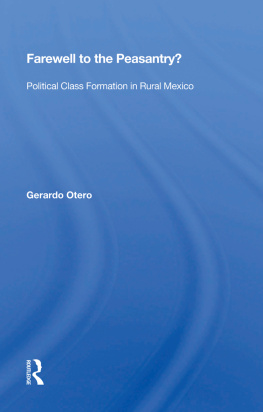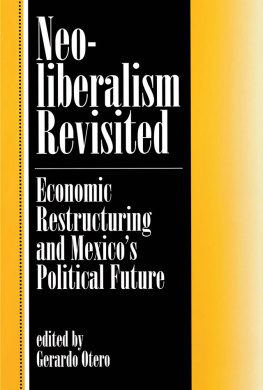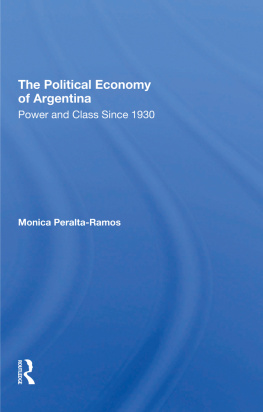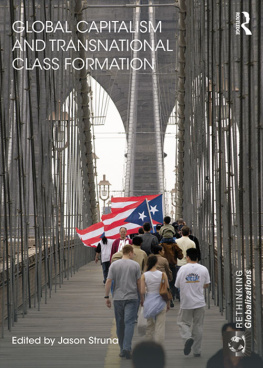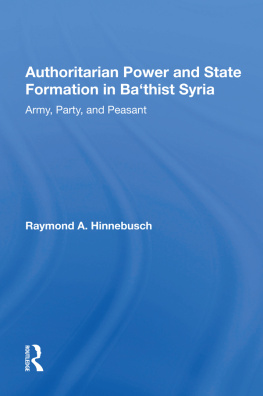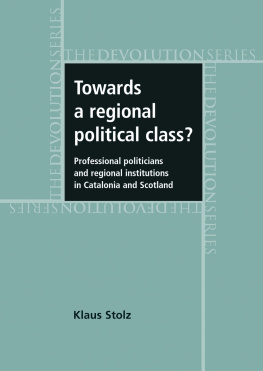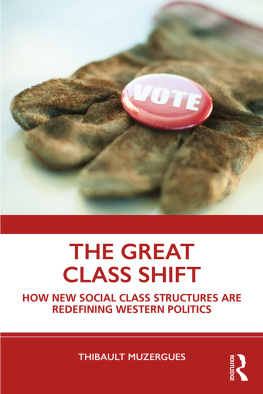First published 1999 by Westview Press
Published 2018 by Routledge
52 Vanderbilt Avenue, New York, NY 10017
2 Park Square, Milton Park, Abingdon, Oxon OX14 4RN
Routledge is an imprint of the Taylor & Francis Group, an informa business
Copyright 1999 by Taylor & Francis
All rights reserved. No part of this book may be reprinted or reproduced or utilised in any form or by any electronic, mechanical, or other means, now known or hereafter invented, including photocopying and recording, or in any information storage or retrieval system, without permission in writing from the publishers.
Notice:
Product or corporate names may be trademarks or registered trademarks, and are used only for identification and explanation without intent to infringe.
Library of Congress Cataloging-in-Publication Data
Otero, Gerardo.
Farewell to the peasantry?: political class formation in rural
Mexico / Gerardo Otero.
p. cm.
Includes bibliographical references and index.
ISBN 0-8133-3645-7
1. PeasantryMexicoPolitical activity. 2. Political
leadershipMexico. 3. Social classesMexico. I. Title.
HD1339.M4089 1999
322.4'4'08863dc21
99-10741
CIP
ISBN 13: 978-0-367-00721-8 (hbk)
This book is lovingly dedicated to the memory of my son and great friend Rodrigo Otero-Ordez (1979-1997). His company during and after his seventeen years of life has been warm and inspiring. Even now, with the deep pain of his loss, I feel his presence as a strong, invigorating force that has been essential to my completion of this project, which I dedicate to his life and surviving spirit.
This book is about the agrarian question in Mexico, the social class structure, agrarian struggles, and agricultural state policy. In different waysas a student, as a teacher, as a researcher, as a personI have been concerned with this topic for over two decades. Curiously, however, what originally sparked my interest in this topic was the urban question.
As an undergraduate student in Monterrey, Mexico, during the early 1970s, I was very impressed with the squatter settlers' movement, then at its peak. Not only did I think of it as a highly explosive social movement, but I was also appalled by the unimaginable conditions of misery under which people in the slums lived. I had never seen such poverty, not even in the countryside of La Laguna in north-central Mexico, the region in which I grew up. I wondered why large numbers of people would migrate to the second-largest industrial city in Mexico when employment opportunities there were scarce. Soon I realized that the vast majority of these migrants actually came from central and southern Mexico, where the agrarian crisis was taking its toll much more severely than in the north. I finally began to understand that both the urban and the agrarian questions were, in fact, two sides of the process of capitalist development in my country.
Research for this book has been supported by many institutions since the early 1980s. In particular, I received grants for field work from the University of Guadalajara and Simon Fraser University (the President's Research Grant). The Center for U.S.-Mexican studies gave me a grant to pursue research as part of the Ejido Reform Research Project, coordinated by Wayne Cornelius and David Myhre. Finally, I have received two generous grants from the Social Sciences and Humanities Research Council of Canada, one for 1994-97 and another for 1997-2000. The first was critical in allowing me to finish the necessary updates for this book. I gratefully acknowledge all of these funding sources.
Because the field work that undergirds the theoretical framework of this study took place in the state of Puebla, I would first of all like to thank my students and colleagues in the Department of Social Anthropology at the Autonomous University of Puebla in the early 1980s. It was in discussion with them that I began to incorporate the concept of culture into my analysis of agrarian problems. I also became indebted to the people of Xochimilco, in the municipality of Tecamachalco, Puebla, for opening their hearts and minds to me and for providing a place to stay while I was doing field work.
Before my Ph.D. studies at the University of Wisconsin (from which this book originated), I took an M.A. at the University of Texas at Austin. There, four visiting professors had a strong theoretical influence on my work: Bernardo Berdichewsky, Juarez Rubens Brando Lopes, Norman Long, and Bryan Roberts. As my thesis supervisor, Norman was warm, inspiring, and quite generous with his time.
While I was in Madison, the Department of Rural Sociology provided me with a very pleasant working environment and abundant material support. The Department chair, Gene Summers, was always kind and ready to help.
Of the many intellectually exciting experiences in Madison, one stands out: the Andean Seminar organized by Gene Havens in the fall of 1978. I will always be grateful for the stimulating exchanges I had with Gene, Manuel Chiriboga, Jaime Crispi, Jorge Dandler, Fernando Rojas, Carlos Samaniego, and Bernardo Sorj.
There were many people who read and commented on parts of this manuscript as it became a dissertation. I wish explicitly to acknowledge the help of Brett Brown, Toms Dupl, Jonathan Fox, Jess Gilbert, Robert Jenkins, Cassio Luisseli, Pat Mooney, Keith Moore, Max Pfeffer, Joey Sprague, William Thiesenhusen, Norberto Valdz, and Gene Wilkening. Bill Canak and Mike Rogers are friends whose incisive and detailed critiques helped me reorganize and develop many of my ideas. David Kaimowitz was a virtual fourth member of my reading committee.
I am indebted to Jack Kloppenburg and Florencia Mallon for reading the entire manuscript and providing me with valuable comments. Special thanks go to Jack, who gave me time off from my duties as a research assistant to complete my writing. For timely support and encouragement, Marta Tienda merits particular recognition. Also, in discussing with me parts of this book, Marta was helpful in reorganizing the arguments, clarifying a number of points and, generally, in making them more compelling.
Erik Wright provided me with reliable and responsible support from the very beginning of my doctoral studies. As one of my three reading advisors, Erik's incisive and radical class-reductionist critiques saved me from my own culturalist excesses. Roger Bartra was also a reader in my committee. Despite the fact that much of my project represents a critique of his early work, he has always been open to and supportive of my point of view. In any case, I must acknowledge that Roger's work has had a profound influence on my thinking. In fact, Roger's now-classic Estructura Agraria y Clases Sociales en Mxico (1974a) ( Agrarian Structure and Political Power in Mexico, 1993 ) laid the very foundations for future research and discussion on the agrarian question in Mexico.
I can hardly find words to describe how highly I value my academic and personal relationship with my major professor, Ivan Szelnyi, and how fortunate I am to have worked with him. I can only hope that Ivan's example and influence has been reflected in my own development as a person and a scholar.

